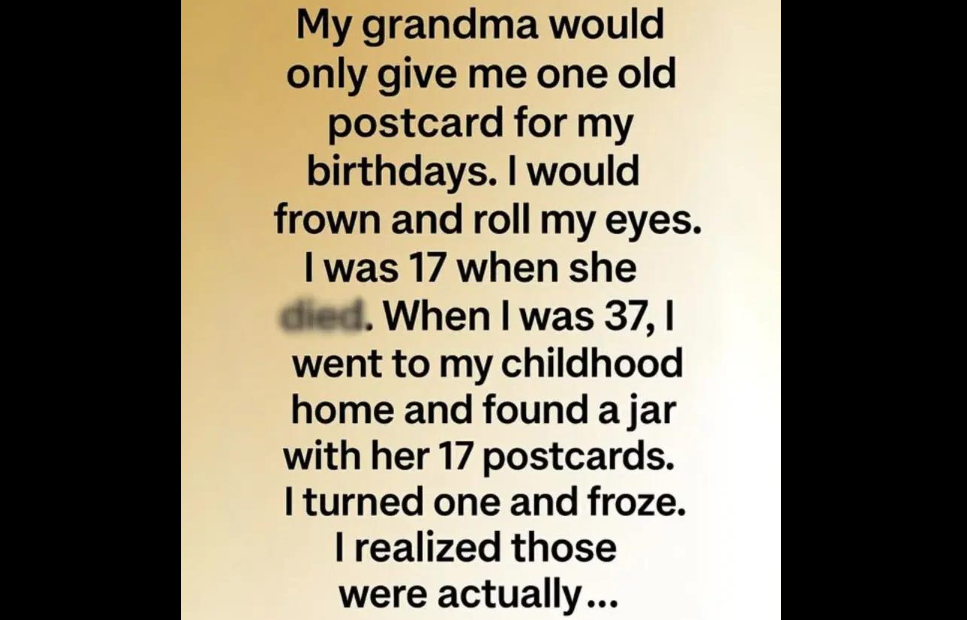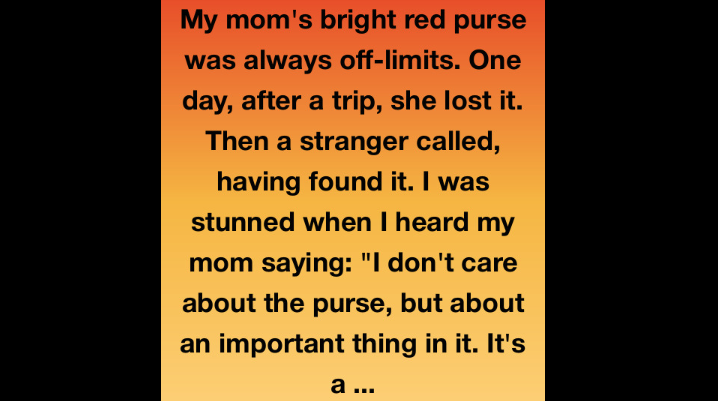Each year, Grandma Zahra handed me a single vintage postcard on my birthday. I’d sigh and give an exaggerated eye-roll, unimpressed by the gesture.
I was 17 when she passed away. At 37, I returned to my childhood home and discovered a jar containing her 17 postcards, tucked away in a forgotten corner.
I picked one up and paused, stunned.
Those postcards weren’t mere keepsakes—they held secrets.
Each bore a handwritten note, short phrases that once felt like quirky grandmotherly wisdom. Lines like, “A creaky door isn’t always locked,” or “Truth hides where consensus fades.” As a kid, I thought they were odd, flowery sayings. But now, seeing them all together, I noticed something more.
On each postcard’s back, certain letters were underlined in vibrant ink, each a different hue. I spread all 17 across the kitchen table, my hands trembling. I began transcribing the underlined letters in sequence.
At first, they seemed random.
Then, gradually, words took shape: “CHECK THE CEDAR HOPE CHEST. BOTTOM.”
That chest had stood in her room my entire life. I always thought it held musty linens or mothball-scented blankets. Since her passing, I hadn’t given it a second thought, too caught up in my teenage arrogance to care.
Now, a 37-year-old single mom, recently divorced, I stood in the dusty guest room of my childhood home, pulse racing like I’d stepped into an adventure novel.
I knelt by the chest and opened it. The familiar scent of lavender and aged wood wafted out. I lifted out crocheted doilies, two embroidered pillowcases, and a worn quilt. Nothing out of the ordinary.
Then I spotted it—a false bottom.
After some careful effort, I managed to lift it without causing damage. Beneath it lay a faded red folder, stuffed with papers. On top, a yellow sticky note in her distinctive handwriting read:
“Read these when you’re ready to know my true self.”
I sat cross-legged on the floor, the folder resting in my lap. The first item was a black-and-white photo of a younger Grandma Zahra, perhaps in her twenties, standing before a train station. She wasn’t alone.
A man I didn’t recognize stood beside her, his arm around her shoulders.
She was visibly pregnant.
I stared at the image for what felt like hours. Grandma Zahra always said she married young, had my dad at 22, and was widowed by 30. The man in the photo wasn’t my grandfather. He looked different—darker skin, possibly Indian or Middle Eastern, with striking eyes and a bold posture.
I turned to the next page—a letter, dated 1962.
My dearest Zahra,
If you’re reading this, our daughter is safe. You found a way to freedom.
I’m sorry I couldn’t escape with you. I hope she has your strength, your gaze. Tell her I loved her, even from a distance.
Forever,
A.
Daughter?
Hold on.
My dad had no siblings.
As I read further, a revelation began to build inside me, heavy and unstoppable.
This wasn’t about a cousin or distant relative. This was about me.
Grandma Zahra wasn’t my biological grandmother.
She was my mother.
The postcards, the cryptic notes, the hidden messages—they weren’t a playful puzzle. They were her way of revealing my true origins, delivered gently, in a way she hoped I’d one day grasp.
I spent hours on the floor, absorbed in every letter. She had fled Iran in the early ’70s, in love with a man her family deemed forbidden. He was a journalist, marked by the regime. She escaped. He didn’t. She gave birth to me in a Greek refugee shelter.
Alone and frightened, with no means to provide for us, she arranged for her distant cousin in America to adopt me as a newborn. She followed soon after, took a job as a house cleaner, and stayed close, watching from afar.
When I was five, she became our family’s “nanny.” My adoptive parents—distant relatives, not strangers—welcomed her without question.
I never suspected.
She never spoke it aloud.
Instead, she sent postcards. One per year, each with veiled words that now felt like urgent murmurs: I’m your mother. I’ve always been your mother.
That night, I wept until I felt hollow.
For the next week, I pored over every letter, reading each one multiple times. I took leave from work. I kept it to myself. It was too vast, too precious, too overwhelming.
Then, something unexpected happened.
Memories began to surface. Tiny moments from childhood.
How she always knew exactly what I needed when I was ill. How she sang a unique lullaby I never heard elsewhere. How she once fiercely swatted a man’s hand away from me in a store, her anger startling everyone.
I used to think she was simply overprotective.
Now I understood. She was clinging to me with everything she had.
She’d lost so much. And kept losing, silently.
Yet she never let me go.
The real surprise?
She never told my adoptive parents the truth.
At the bottom of the folder, I found an unsent letter addressed to them, written a year before her death. It was her confession, explaining everything, asking for forgiveness, and hoping I’d one day understand.
I’d often resented her strictness, her occasional distance.
Now I saw why she built that wall. She carried the weight of her secret every day.
I sat with that truth for a long time.
Then, I made a choice.
I called my adoptive parents and shared everything.
They were quiet at first. My mom wept. My dad stayed silent so long I thought the line had gone dead.
Then he spoke words I’ll always carry: “She loved you more fiercely than we ever could. We sensed it. We just didn’t know why.”
The following week, I brought the letters to their house. We read them together. There were tears, but also laughter—stories I’d never heard. The full truth finally came into focus.
And the most poetic turn of all?
Grandma Zahra left me her house in her will—a modest bungalow in Oregon I never thought I’d care about. I was in LA, grinding through a high-pressure marketing job, exhausted and jaded from my recent divorce.
That house became my refuge.
I left the city, moved north, and started a small creative studio from her kitchen table. My daughter, Reya, now six, has a backyard, clean air, and a neighbor who brings us baklava every Friday.
And the best part?
I began writing postcards to Reya.
Not simple birthday cards, but meaningful messages. Words I want her to hold onto when she’s ready to understand.
Because love doesn’t always shout. Sometimes, it speaks softly for years, waiting to be heard.
Here’s what I’ve learned:
Not every secret is a deception. Some are sacrifices, cloaked in quiet, crafted by love.
And if you’re fortunate, the truth eventually finds its way to you.
If this story touched you, share it with someone who might need it. You never know whose heart it could reach. ❤️




